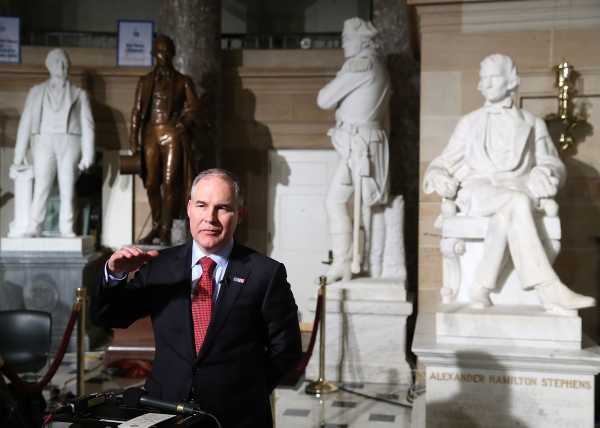
The Environmental Protection Agency under Administrator Scott Pruitt is chipping away at environmental regulations from all sides. Pruitt is rolling back rules on limiting air pollution. He is halting implementation of greenhouse gas restrictions. He is weakening enforcement against polluters. And he is stalling for time on many other responsibilities.
But deeper changes at the EPA may still be to come: eroding the foundations of the rules themselves, through restrictions on science.
Since assuming control of the agency, Pruitt’s taken unprecedented steps to oust the agency’s science advisers and replace them with researchers from industry and from states that have previously sued to block environmental regulations.
While his taste for luxury air travel hogs the headlines (he’s spent $2,261 per week on travel, according to the New Republic), Pruitt is now readying a salvo to take out the underlying research for environmental regulations. According to an E&E News report, at a closed-door meeting at the Heritage Foundation earlier this month, Pruitt said he plans to change how the agency uses science to inform its work. (The EPA did not respond to a request from Vox for comment.)
Specifically, he wants to limit the types of studies the agency can use to develop policies with rules modeled on the HONEST Act, a bill championed by outgoing House science committee chair Rep. Lamar Smith (R-TX) to eliminate “secret science.”
Pruitt takes a dim view of science in general: He doesn’t believe that humans are causing climate change, and said “[t]here aren’t sufficient scientific facts to establish the theory of evolution.” He proposed holding a prime-time climate change debate, a format ill-suited to evaluating science. (The idea was shot down by White House chief of staff John Kelly.)
Together, a higher bar for science and a stacked slate of industry-friendly scientists weaken the case for developing new rules and undermine the rationale for existing regulations. That means stricter limits on pollutants like ozone may not go into effect and the EPA may not have the foundations to tackle emerging environmental health threats like the harm from newly introduced chemicals.
Here’s how Pruitt is already changing the role of research at the EPA to bring about outcomes that favor the groups that the agency is supposed to regulate.
Science is the foundation of the EPA’s work, and it’s being eroded
As an agency that protects public health, the EPA draws on a wide body of research to inform regulations like how much lead is safe in drinking water (less than 15 parts per billion, in case you were wondering).
Congress has mandated that the agency use the best available science when it comes up with limits for hazardous chemicals or evaluates the effectiveness of its own regulations.
The Clean Air Act, for example, directs the EPA to “conduct, and promote the coordination and acceleration of, research, investigations, experiments, demonstrations, surveys, and studies relating to the causes, effects (including health and welfare effects), extent, prevention, and control of air pollution.”
Related
“Climate change” and “global warming” are disappearing from government websites
This is a constant, ongoing process, with new scientific findings trickling in and new gaps in knowledge being uncovered. That’s why the EPA maintains a stable of science advisers who are up to date on the latest research to help evaluate scientific findings on their merits.
Most of these scientists come from universities and fund their academic research with grants from the EPA. But in his first big attempt to shape the science, Pruitt said last October that getting an EPA grant and advising the agency is a conflict of interest, and removed scientists from advisory boards who were getting EPA money for their work.
Yet many of their replacements are coming from state environmental agencies that also get funding from the EPA, which, according to Pruitt, isn’t an unbearable conflict of interest. Nor is it a conflict of interest to advise the EPA if you work for a state agency that is suing the federal agency to block its rules. It’s also not a conflict if you’re a science adviser also working for a chemical manufacturer or an oil company, industries the EPA regulates.
Betsy Southerland, who led EPA’s Office of Science and Technology in the water division before resigning in protest in July, told Vox that the EPA historically did give industry scientists a seat at the table, provided they passed the same ethics reviews that academic scientists faced and they recused themselves from issues that would affect their employers or industries.
Some of the new additions, however, have long campaigned against environmental regulations and are coming to the advisory board with an agenda. The new chair of the Science Advisory Board, Michael Honeycutt, spent much of his career arguing against the EPA’s ozone restrictions.
“Now they’re adding people who were very vocal and articulated in public opposition to environmental rules,” Southerland said. “It will be difficult to separate out. That is my great fear.”
As the saying goes, personnel is policy, and with a roster like that, the policy seems to be that science must side with industry or else it will play a minimal role going forward.
Pruitt’s next move is to set an absurdly high standard for public health research
The next likely target is a set of rules based on the HONEST Act that passed the House and died in the Senate last year. Proponents hailed the bill as a transparency measure (and who could vote against a name like the “HONEST Act”?).
But the bill would drastically reduce the pool of scientific research that the EPA could draw on to make rules by only allowing the agency to use research where the underlying data is made available to the public and the experiments are reproducible.
“They’re really designed to prevent us from getting the information we need to protect public health,” former EPA Administrator Gina McCarthy told the Atlantic about the HONEST Act last year.
Southerland explained that much of the raw data from older research is simply not available anymore (and some of the people involved are dead). Many environmental health studies involve confidential patient information, and industry-led research often has proprietary details about companies. That would take a large number of studies out of consideration for rule-making.
And the raw data that would be posted could be easily cherry-picked or misread, clouding the policy discussion. As for reproducibility, many key environmental findings stem from one-off events, like the 2010 Deepwater Horizon oil spill, so those results can’t be repeated.
Putting these rules into effect would therefore cull the number of scientific studies available to the EPA, and it would cost $250 million a year to implement, according to a Congressional Budget Office analysis.
For now, the EPA is playing its cards close to the chest and hasn’t released any draft rules or a timeline for its science transparency effort. But environmental advocates and groups like the Union of Concerned Scientists are readying legal challenges should the rules go into effect.
Sourse: vox.com






